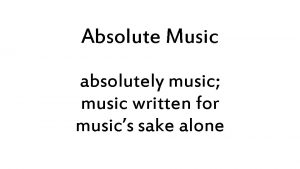Music in History Music in History Oldest written








- Slides: 8

Music in History

Music in History • Oldest written song yet known - "Hurrian Hymn no. 6" • Preserved for 3400 years on a clay tablet, written in the Cuniform text of the ancient Hurrian language • Discovered in Ugarit in Syria in the early 1950 s

Music in History • Two Delphic Hymns to Apollo from Ancient Greece – Dated c. 138 BC and 128 BC – Found inscribed in stone in Delphi in 1893 • Hymn to Zeus – by Cleanthes (331 -232 B. C. ) • The book of Psalms from the Christian Bible contains lyrics of Jewish hymns

Music in History • Music was passed on orally. • In the 6 th century music began to be written down. • Notated music began in the Christian church when monks wrote down their chants. They were almost the only people who could read or write.

Music in History • The earliest music in the medieval church was called plainsong, plainchant, or Gregorian chant. (named after Pope Gregory) • Chants were a single line of text and melody with smoothly flowing lines that followed the rhythm of the text.

Music in History • Music outside the church was performed by minstrels or troubadours who traveled between feudal courts of Europe. • Up to the Middle Ages, music was monophonic. (from Greek, meaning “single-sounded”)

Music in History • During the late Middle Ages two or more melody lines were sung or played simultaneously giving more depth to music. • This is called polyphonic music. Polyphonic is from Greek, meaning “many-sounded”. • At first the two melody lines moved with the same rhythm and were parallel, a 4 th or 5 th apart.

Music in History • In the late 11 th century, musicians began to elaborate on this simple style of harmony by having the lower voices hold long notes while the higher voice had a free-flowing melody line. • The lower voice was called the tenor, from the Latin tenere, meaning “to hold. ”















